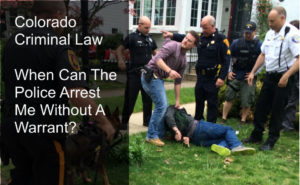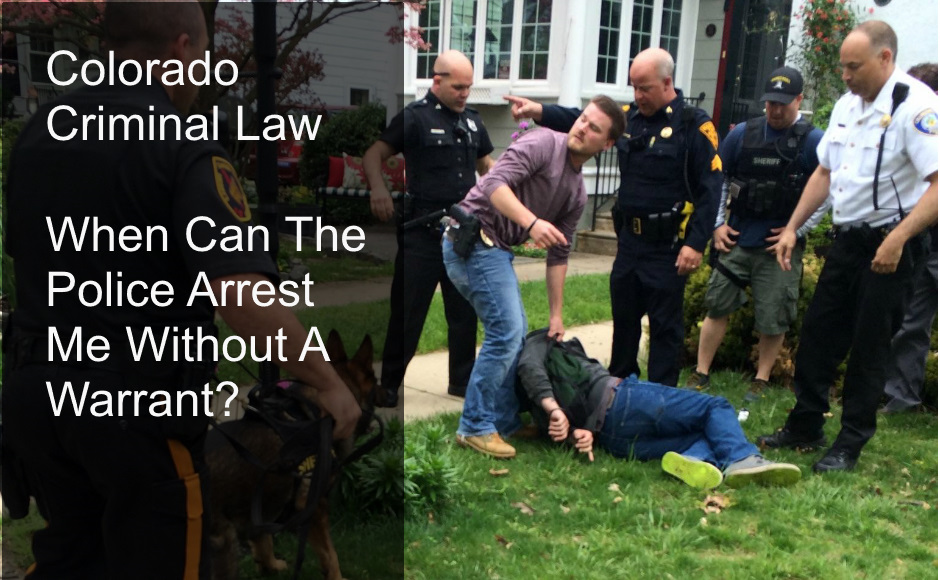




Colorado Criminal Law – When Can The Police Arrest Me Without A Warrant?
By H. Michael Steinberg – Colorado Criminal Defense Lawyer – Attorney
 Colorado Criminal Law – When Can The Police Arrest Me Without A Warrant? One of the most frightening and least understood experiences in our lives can be being placed under arrest. One way to understand and to fully employ your fundamental Constitutional rights is to understand the methods and procedures used by the police to arrest you under Colorado law.
Colorado Criminal Law – When Can The Police Arrest Me Without A Warrant? One of the most frightening and least understood experiences in our lives can be being placed under arrest. One way to understand and to fully employ your fundamental Constitutional rights is to understand the methods and procedures used by the police to arrest you under Colorado law.
This article outlines the extent of the limits of the Colorado police power to arrest.
What Is An Arrest?
An arrest is seizure or forcible restraint. An arrest is an exercise of the government’s power to deprive a person of his or her liberty. It is the taking or keeping of a person in custody by legal authority, typically in response to a Colorado criminal charge.
While individuals can be taken into custody for many reasons, the Government must bring the arrestee before a Court or otherwise secure the administration of the law.
Compare An “Investigatory Stop” Or “Detention
An “investigatory stop” or “detention” is not legally considered to be an “arrest.” By definition it must be limited and temporary. It can last no longer than necessary to carry out the purpose of the stop or detention.
An investigatory stop that continues for too long becomes a de facto arrest. If and when that happens, the arrest must comply with the warrant requirements of the Fourth Amendment.
While there is no “bright line” rule that clearly defines when an “investigatory stop” becomes an arrest. The Courts view each case on its facts without placing artificial time limitations on the police which will most often turn on the nature of the investigation. The Courts will look at whether the police “acted with reasonable dispatch to quickly confirm or dispel the suspicions that initially induced the investigative detention.”
When Can A Colorado Police Officer Make An Arrest?
A police officer may arrest a person when:
- Arrest Warrant – There is a warrant commanding that such person be arrested;
- A Crime Is Committed In The Presence Of The Police – Any crime has been or is being committed by such person in the officer’s presence;
- Probable Cause – There is probable cause to believe that an offense was committed by the person to be arrested.
The Right Of The Police To Make An Arrest Outside Of Their Jurisdiction
The police may arrest persons outside their jurisdiction (but within the State of Colorado) for felonies and misdemeanors that are being, or have been committed, in the presence of that police officer.
When this situation happens – the “out of jurisdiction” police officer will notify the local law enforcement agency that has jurisdiction over the location and then release the arrested person to the custody of the local law enforcement agency.
The out of jurisdiction officer will then complete a report that is used by the local law enforcement agency in completing their investigation.
Are There Limitations On How And When To Make An Arrest
- When? -The law permits an arrest to be made on any day of the week and at any time of the day or night.
- How Much Force? The Law allows the police to use all necessary and reasonable force when making an arrest.
- Entry Into A Property – The Law also allows the police to use all necessary and reasonable force to gain entry into any building or property or part thereof to make an authorized arrest.
When Can The Police Stop A Person?
A Colorado police officer has the legal right to stop any person who the police officer reasonably suspects:
- is committing,
- has committed, or
- is about to commit a crime.
That officer can require that person to show identification and ask for the following:
- The person’s name.
- The person’s address.
If the suspect is, at the time, driving a motor vehicle, the officer may also ask for:
- The person’s driver’s license.
- The person’s automobile registration.
- The person’s proof of insurance.
- An explanation of the person’s actions (such as where they are coming from or going to).
While the person contacted is not required to answer any questions – the law does not consider this situation an “arrest.”
While the person does not have to reply, the law does not constitute an arrest. C.R.S. 16-3-103.
When Can The Police Conduct A Frisk Of A Person That Has Been Legally Stopped?
Colorado law allows the police to “frisk” you if you have been stopped for questioning when there is evidence of risk to his or her personal safety…that is that the office reasonably suspects that the officer’s personal safety requires it. Only then may the officer conduct a limited search, or “frisk” by patting down your outer clothing for weapons.
If officer’s frisk reveals what feels like a weapon, the officer may search for and remove the item from your clothing.
The officer may remove any:
- Weapons,
- Contraband (that is – the possession of any illegal item),
- Stolen goods
If, and when, the frisk reveals an illegally possessed weapon, the officer may then arrest that person and conduct a full search of the person and the immediate area within the person’s reach.
Does The Person Have A Right To Know WHY They Are Being Arrested?
Yes – A person has the right to know for what he is being arrested, and to be advised of his rights when that is required, the advisement under Miranda IF the police intends to question the person arrested.
Colorado Criminal Law – When Can The Police Arrest Me Without A Warrant?
If you found any of the information I have provided on this web page article helpful please click my Plus+1 or the Share buttons for Twitter and Facebook below so that others may also find it.
The reader is admonished that Colorado criminal law, like criminal law in every state and at the Federal level, changes constantly. The article appearing above was accurate at the time it was drafted but it cannot account for changes occurring after it was uploaded.
If, after reading this article, you have questions about your case and would like to consider retaining our law firm, we invite you to contact us at the Steinberg Colorado Criminal Defense Law Firm – 303-627-7777.
Never stop fighting – never stop believing in yourself and your right to due process of law. You will not be alone in court, H. Michael will be at your side every step of the way – advocating for justice and the best possible result in your case. H. Michael Steinberg is passionate about criminal defense. His extensive knowledge and experience of Colorado Criminal Law gives him the edge you need to properly handle your case
 ABOUT THE AUTHOR: H. Michael Steinberg – Email The Author at:
ABOUT THE AUTHOR: H. Michael Steinberg – Email The Author at:
A Denver Colorado Criminal Defense Lawyer – or call his office at 303-627-7777 during business hours – or call his cell if you cannot wait and need his immediate assistance – please call 720-220-2277.
“A good criminal defense lawyer is someone who devotes themselves to their client’s case from beginning to end, always realizing that this case is the most important thing in that client’s life.”
You should be careful to make a responsible choice in selecting a Colorado Criminal Defense Lawyer. We encourage you to “vet” our firm. Over the last 40 plus years – by focusing ONLY on Colorado criminal law – H. Michael has had the necessary time to commit to the task of constantly updating himself on nearly every area of criminal law, to include Colorado criminal law and procedure and trial and courtroom practice.
Putting more than 40 years of Colorado criminal defense experience to work for you.
H. Michael Steinberg welcomes your inquiry and do not charge for initial telephone consultations.
H. Michael works hard to get his clients the best possible results in and out of the courtroom. He has written, and continues to write, extensively on Colorado criminal law and he hopes this article helps you in some small way – Colorado Criminal Law – When Can The Police Arrest Me Without A Warrant?

Other Articles of Interest:
- Colorado Active Warrants
- Outstanding Warrants
- Colorado Criminal Law – Attacking a Colorado Criminal Arrest Warrant – A “Franks” Challenge and Hearing To Dismiss The Charges
- Colorado Criminal Search And Seizure Law – Police Cannot Enter Your Home Without Search Warrant To Arrest Third Party
- FAQ: Colorado Law Automobile Searches












